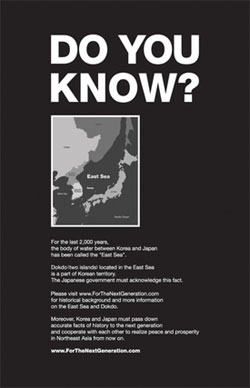A 24-year-old Korean backpacker was shocked while traveling in Europe in 1996. Most people Seo Kyoung-duk met during his European trip had very limited knowledge about Korea, and asked if he was from China or Japan. Out of sheer embarrassment, he wanted to hide somewhere.
Recalling his experience in Europe 12 years ago, Seo now works around the clock to promote Korea overseas as a self-directed public relations specialist who has raised global awareness of the country's diplomatic issues, including the issue of Dokdo, Korea's rocky islands located in the East Sea.
Seo's first Dokdo promotion campaign began in July 2005. His advertisement "Dokdo is a Korean Territory" in the New York Times' July 25 version made him become the first Korean to focus global attention on Korea's rocky islands in a major U.S. leading daily.

Dokdo full-page ad in the July 9 2008 edition of the New York Times
Since Seo's first ad in the New York Times, his efforts gained public support from both in and outside Korea. Thanks to funding from related groups and individuals, including singer and donor Kim Jang-hoon, Seo has so far placed six Dokdo advertisements in three leading U.S. dailies -- the New York Times, the Wall Street Journal and the Washington Post.
Seo's latest Dokdo full-page ad in the July 9 edition of the New York Times begins with the title "Do you know?" on a black background. Thanks to the ad containing a short yet intense message, Seo raised international awareness on Dokdo issue and received a number of emails from around the world, including some from Japanese rightists threatening his life.
Seo's next target for the Dokdo promotion campaign is New York's Times Square, where most popular international enterprises, including Korea-based Samsung and LG, display their ads on giant billboards to attract attention. In early September, Seo visited New York to organize a project team for his plan and he believes the next ad will bring about the largest effect ever.
Besides Dokdo, Seo also focuses on other history issues, including the issue of comfort women. His advertisement, "Comfort Women" in the April 17, 2007, edition of The Washington Post, featured former sex slaves who had been confined to Japanese military brothels during the Second World War. In June 2007, U.S. lawmakers passed House Resolution 121, a bill calling for Tokyo's full apology for past wartime atrocities.
When China claimed Korea's ancient kingdom Goguryeo (37 B.C.-A.D. 668) as China's history as part of its history distortion ambition known as the "Northeast Project," Seo put an ad in the New York Times on Feb. 11, 2008, clearly stating that Goguryeo is a part of Korean history and urging the Chinese government to acknowledge the fact.
The Korean alphabet Hangeul is also included in Seo's list of campaign promotions. He continues to promote Hangeul overseas as his other campaign and is creating a video advertisement about Dokdo for New York's Times Square. Last February, Seo convinced installation artist Kang Ik-joong, 48, to donate his block artwork titled 'Youth" to the UNESCO headquarters in Paris. Each of the small pieces of this work of art is painted in Korean characters from a popular Korean essay titled "Praise of Youth" (unofficial translation) by Min Tae-won in vivid colors on the wall, transforming literature into art.
Kang and Seo plan to donate Hangeul installation art to Harvard University and University of California Los Angeles in the United States. Kang's artwork will be also presented to the UNESCO Peace Center located in Icheon, Gyeonggi-do, in mid-October this year.
This is part of his plan to promote February 21 as International Mother Language Day to encourage, develop and promote the teaching of mother languages. As Hangeul's systematic and scientific character contribute to Korea's literacy rate being one of the highest in the world, UNESCO rewards individuals or organizations that achieve effective results in fighting illiteracy with the King Sejong Literacy Prize, named after King Sejong the Great (1397-1450) who created Hangeul to help uneducated commoners read and write in the Joseon Dynasty (1392-1910).
By Yoon Sojung
Korea.net Staff Writer